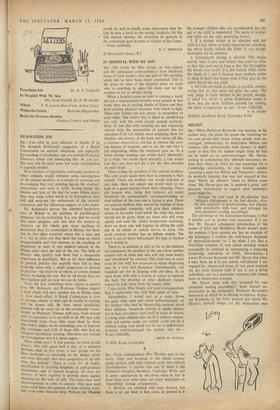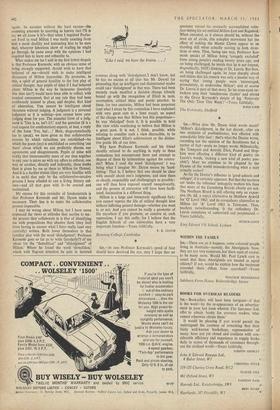MILTON
SIR,—When Professor Kermode was making, in his jocular way, the point (to quote the rendering we are now given) that 'many young people were en- couraged, prematurely, to undervalue Milton and compare him unfavourably with Donne,' it didn't occur to him that his readers might think he had me in mind as an arch-encourager. Mr. Dyson, writing to corroborate this affirmed innocence, re- lates that when, in 1945, he was preparing for a Cambridge scholarship, he was warned against 'parading a taste for Milton and Tennyson': advice, he modestly hazards, that was 'not unusual at that time.' Where his adviser's 'views on Milton came from,' Mr. Dyson goes on, 'is anybody's guess,' and proceeds immediately to suggest what anybody's guess might be: Perhaps he had' read in Revaluation that 'Milton's dislodgment in the last decade, after his two centuries of predominance, was effected with remarkably little fuss,' and arranged his own permitted reading accordingly.
The advantage of the insinuation-technique is that it enables you to protest your innocence. If I say that Mr. Dyson's subsequent introduction of the names of Eliot and Middleton Murry doesn't make the sentence I have quoted any less an example of the technique, I confirm the well-known diagnosis of persecution-mania (as I do when I say that a Part-Time Lecturer of very junior standing cannot reasonably be adduced as representing a menacing Cambridge orthodoxy of 1945). Nevertheless, I assure Professor Kermode and Mr. Dyson that when I take them up it is not merely self-defence I am engaged in : impersonal issues of very great moment are my main concern (and if one is not a living individual, and in a particular situation, one cannot have an impersonal concern).
Mr. Dyson, then, with that 'arranged his own permitted reading accordingly,' lends himself un- mistakably to the insinuation Professor Kermode's innocence of which he is offering to endorse. Profes- sor Kermode, in the letter printed just above Mr. Dyson's, himself brings out the insinuation once
again : he assumes without the least excuse—the assuming amounts to asserting as known fact ('It Is so; we all know it is)—that when I required Profes- sor Ford to read Milton I was really exacting from him a meek docility and instructing him to be sure that, whatever laborious show of reading he might go through, he came away with the opinions 1 had required him to learn and subscribe to. What makes me (as I said in my first letter) despair is that Professor Kermode, with an obvious sense of being strongly supported, should wish to have that believed of me—should wish to make intelligent discussion of Milton impossible. He promotes, in this, a spirit of general hostility to the free play of critical thought. Any pupils of mine if I had behaved about Milton in the way he insinuates (jocularly this time too?) would have been able to reflect, with ironical amusement, that at any rate they had been assiduously trained to place, and despise, that kind of aberration. You cannot be intelligent about literature without judging. A judgment is a personal judgment or it is nothing—you cannot have your judging done for you. The essential form of a judg- ment is 'This is so, isn't it?,' and the question (it is a real request for confirmation) expects, at best, a reply of the form 'Yes, but ...' Here, diagrammatically (so to speak), we have given us that collaborative process by which valuations are established—by which the poem (say) is established as something 'out there' about which we can profitably discuss our agreements and disagreements. Pupils of mine will testify that immeasurably more of our time together in any year is taken up with my offers to enforce, one way or another, directly and indirectly, these truths than is given by me or them to Milton (or Donne). And it is a further truism (they are very familiar with it as such) that only by the collaborative-creative process I have alluded to can a living literary cul- ture—and all that goes with it—be created and maintained.
My excuse for this reminder of fundamentals is that Professor Kcrmode and Mr. Dyson make it necessary. Their line is to make the collaborative process impossible.
I may be wrong about Milton, but I have never expressed the views or attitudes they ascribe to me: the process they collaborate in is that of identifying me with propositions that absolve them (they feel) from having to answer what I have really (and very carefully) written. Both lower themselves to that familiar play with the word 'dislodgment'; Professor Kermodc goes so far as to write (jocularly?) of my 'plans for the "demolition" and "dislodgment" of Milton.' Where he found the word 'demolition,' which with flagrant intention he puts in inverted 'Like I said, we have the brains. . . :
commas along with 'dislodgment:I don't know, but he has no excuse at all (nor has Mr. Dyson) for pretending that an intelligent and disinterested reader could take 'dislodgment' in that way. There had been recently made manifest a decisive change (closely bound up with the recognition of Eliot) in taste, assumption, critical ideas and poetic practice. In these, for two centuries, Milton had been prepotent (and what I mean by this contention I have explained with very great care in a later essay); an aspect of the change was that Milton lost this prepotence- he was 'dislodged' from it. It is possible to hold this view while continuing to believe that Milton is a great poet. It is not, I think, possible, while refusing to consider such a view discussible, to be intelligent about Eliot's achievement or the distinc- tive poetic life of our time.
Why have Professor Kermode and his friend steadily refused to do anything in reply to these contentions but misrepresent them and attempt to dispose of them by insinuations against the conten- der? When I used the word 'dislodgment' I was being what I imagine Mr. Dyson means by 'hard- hitting.' That is, I believe that one should be clear with oneself about one's judgments, and state them as clearly, responsibly and challengingly as possible: one will then have exposed oneself unequivocally, and the process of correction will have been facili- tated. Insinuation is a different thing.
Milton is a large and immensely significant fact: you cannot repress the life of critical thought here without inflicting general damage—whether you want to or not. And you cannot be really a promoter of life anywhere if you promote, or connive at, such repressions. I say this sadly, for I believe that the English Schools of our universities have a very important function.—Yours faithfully,
Downing College, Cambridge *
F. R. LEAVIS



































 Previous page
Previous page